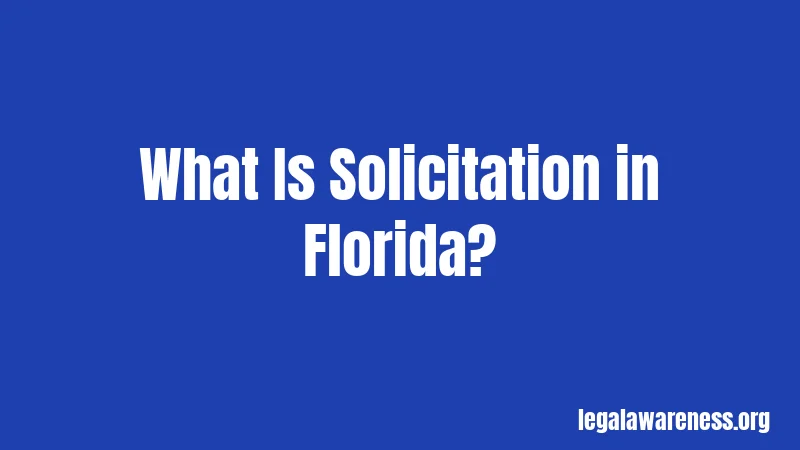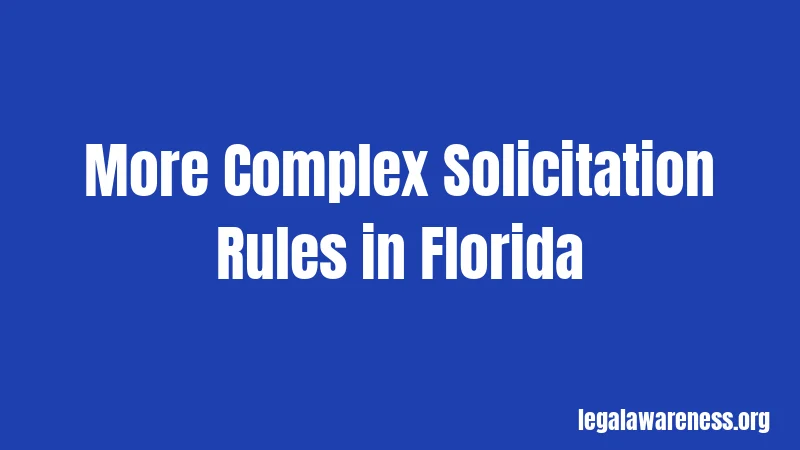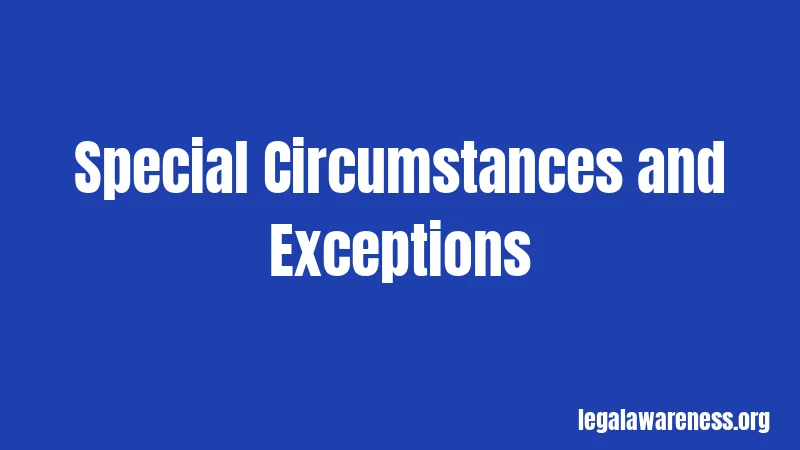Florida Solicitation Laws in 2026: The Complete Street-Level Guide
Most people don’t realize how strict Florida’s solicitation laws actually are. Seriously. You could be breaking the law without even knowing it. Florida has some pretty detailed rules about asking for money, panhandling, and even collecting signatures on the street. And the penalties? They can be surprisingly harsh.
Here’s what you need to know. Whether you’re a street fundraiser, someone who occasionally panhandles, or you’re just curious about what’s legal in Florida, this guide breaks it all down. We’ll cover the specific laws, what counts as a violation, penalties you could face, and what you should actually do if you’re involved in solicitation.
What Is Solicitation in Florida?

Okay, let’s start with the basics. Solicitation means asking someone for money, donations, or services. It also includes collecting signatures, handing out flyers, or promoting causes on public or private property.
Now here’s where it gets tricky. Not all solicitation is illegal. But Florida has specific rules about where, when, and how you can solicit. The laws vary depending on whether you’re on a street, in a parking lot, on a highway, or at someone’s home. You’re gonna want to understand these differences.
Think of it like this: some places welcome fundraisers and panhandlers. Other places are totally off-limits. It depends on the specific location and what the local ordinances say.
Basic Solicitation Laws in Florida
Street Solicitation and Panhandling
Let’s talk about what’s actually illegal. In Florida, it’s generally legal to ask for money on public streets. Most cities allow it. But, and this is important, you can’t be aggressive about it. You can’t follow people around. You can’t threaten them or touch them to get their attention.
Florida law prohibits aggressive solicitation. This means you can’t block someone’s path. You can’t do anything that makes a reasonable person afraid or uncomfortable. If someone says no, you have to accept it and move on. Pretty straightforward, right?
Some cities are stricter than others. Miami, Tampa, and Jacksonville have their own rules. Orlando too. Each city can create ordinances that go beyond state law. So what’s legal in one city might not be legal in another. You need to check your specific city’s rules.
Wondering if this applies to you? If you’re asking for money on the street, it does. If you’re collecting donations for a church or charity, it does. If you’re promoting a cause, same thing.
Time and Location Restrictions
Here’s where things get more specific. Florida prohibits solicitation in certain locations no matter what. Highway on-ramps? Totally illegal. You can’t stand on a highway entrance or exit ramp asking for money. Period. This applies everywhere in the state.
What about parking lots? It depends on the lot. If it’s private property, the owner decides whether solicitation is allowed. If it’s public property, city ordinances apply. You can’t assume it’s okay.
Some cities restrict solicitation during certain hours. Many don’t allow it before sunrise or after sunset. Some ban it during rush hour. A few prohibit it near schools or hospitals. Hold on, this part is important: you really do need to check your specific city’s rules before you solicit anywhere.
Also, solicitation in someone’s home or on their private property requires permission. No permission? It’s trespassing, which could lead to bigger legal problems than a simple solicitation charge.
More Complex Solicitation Rules in Florida

Aggressive Solicitation Laws
Okay, pause. Read this carefully. Aggressive solicitation is treated much more seriously than regular solicitation. Florida law defines aggressive solicitation as demanding money, following someone, using threatening language, or touching someone without permission.
Here’s an example: you ask someone for money, they say no, and you follow them across the street asking again. That’s aggressive solicitation. Much more serious. You could face harsher penalties for this than for regular panhandling.
What counts as aggressive? State law and city ordinances list specific behaviors. Intentionally blocking someone’s path. Standing too close to them. Continuing to ask after they’ve said no. Using curse words or insults. Tapping on car windows. All of these can be considered aggressive.
Most people don’t realize how strict the definition gets. You’re not alone if this confuses you. But the basic rule is simple: if someone is uncomfortable or afraid, you’ve probably crossed the line.
Solicitation Near Highways and Medians
Florida takes highway safety seriously. You absolutely cannot solicit on highway on-ramps, off-ramps, or medians. This law applies statewide. No exceptions.
Why? Safety. When drivers are distracted by someone asking for money, accidents happen. Pedestrians get hit. Cars crash. Florida decided the risk wasn’t worth it.
So even if your city technically allows panhandling, you still can’t do it on a highway entrance. This is a state-level rule. It overrides city ordinances. Violating this one gets expensive and could mean jail time too.
Charitable Solicitation
A friend asked me about this last week. Turns out, many people think charitable fundraising is always legal. It’s not, not without following certain rules.
If you’re collecting money for a legitimate charity, you might need to register with Florida’s Department of Agriculture and Consumer Services. This is especially true if you’re soliciting beyond your immediate community. The charity itself needs to be registered. If you’re collecting money and you can’t prove the charity is legit, that’s a serious problem.
This one’s probably the most important rule for people doing fundraising work. Legitimate charities usually know this already. But if you’re new to fundraising, you need to check. Contact the charity first. Ask whether they’re registered. Get everything in writing.
Penalties and Consequences
Let’s talk about what happens when you break these laws. You need to know the actual penalties because they can be serious.
Simple solicitation without aggression is usually a misdemeanor. First-time offense? You could face a fine up to $250. You might also get community service. In some cities, it’s even cheaper. But some jurisdictions go higher.
Aggressive solicitation is worse. Much worse. This is typically a misdemeanor with fines up to $500. You could also spend up to 60 days in jail. Some cities allow judges to add more jail time on top of that. It depends on the specific charge and whether you have prior violations.
Solicitation on a highway entrance? That’s even more serious. Fines can go up to $500. Jail time? Up to 60 days for a misdemeanor charge. If you’re charged with something more serious, penalties increase significantly.
Think of it like a traffic ticket, but more serious. A regular ticket costs maybe $150. A solicitation charge could cost you $250 to $500 plus potential jail time. Plus court costs. Plus a criminal record.
Here’s where it gets interesting. Multiple violations within a certain time period can lead to enhanced penalties. If you’re cited for aggressive solicitation twice within 12 months, the second charge might be treated more harshly. Three strikes? Even worse.
Also, having a criminal record for solicitation can affect job prospects. Some employers run background checks. Some housing situations require you to disclose misdemeanors. This isn’t just about fines and jail time.
Civil Liability
Wait, it gets worse. Sometimes you’re not just facing criminal charges. You could also face civil lawsuits. If someone can prove they were harmed by your solicitation (emotional distress, for example), they might sue you. This happens less often, but it happens.
Civil suits are separate from criminal charges. You could be fined criminally and also have to pay damages in civil court. Totally separate proceedings. Totally separate bills.
Special Circumstances and Exceptions

Protected First Amendment Activities
Honestly, this is where it gets complicated. The Constitution protects certain types of solicitation as free speech. Handing out flyers about a political cause? Generally protected. Asking for donations to a religious organization? Protected. Collecting signatures for a ballot initiative? Protected.
But here’s the catch: protection doesn’t mean you can do it anywhere, anytime, in any way. You still can’t block people. You still can’t be aggressive. You still can’t violate local ordinances about time and location.
Courts have said repeatedly that states can restrict time, place, and manner of solicitation. What they can’t do is completely ban it based on the content of your message. That’s the difference. Very important distinction.
Nonprofit Organizations
If you’re working for a legitimate nonprofit, there are specific rules. The nonprofit needs to be registered. They need to follow state guidelines. Volunteers need to know the rules too.
Nonprofits don’t get a free pass. They still can’t be aggressive. They still can’t solicit on highways. They still can’t violate local ordinances. But they might have slightly more protection if they’re engaged in legitimate advocacy work.
The key? Everything has to be legitimate. The nonprofit has to actually exist. It has to actually do the work it claims to do. Registration documents need to be available. This is where honest organizations succeed and fraudulent ones get caught.
How to Stay Compliant With Florida Solicitation Laws
Okay, here’s what you should actually do if you’re involved in solicitation.
First, check your city’s specific ordinances. Call city hall. Go online. Look up your city’s solicitation laws. Don’t assume the state laws are the only rules. Your city probably has additional restrictions. Write them down. Know them.
Second, if you’re representing a charity, verify the organization is registered with the state. Ask your boss or the organization’s leadership. Get written confirmation. Keep it on hand. If you’re ever questioned, you can prove you’re working for a legitimate organization.
Third, understand what counts as aggressive solicitation. Don’t follow people. Don’t block paths. Don’t touch anyone. Don’t keep asking after someone says no. These rules are simple, but they matter a lot.
Fourth, respect time and location restrictions. Never solicit on highway on-ramps. Check if your city restricts solicitation near schools, hospitals, or transit stations. Know the hours you can solicit. In many cities, it’s sunrise to sunset. In some, it’s even more limited.
Fifth, consider getting written permission if you’re soliciting on private property. This includes parking lots, shopping centers, and other commercial areas. Permission is always safer than assuming it’s okay.
Sixth, stay aware of current laws. Laws change. Ordinances get updated. Check back occasionally. If you’re doing this regularly, maybe check once a year. It’s not hard. It keeps you safe.
Stay with me here. The most important thing? If you’re unsure, ask. Call your city. Talk to a lawyer if you’re serious about this. Don’t guess. Guessing is how people end up facing charges.
Frequently Asked Questions
Is panhandling legal in Florida? It depends on where and how you do it. Regular, non-aggressive panhandling is generally legal in most cities, but you can’t be aggressive, block people, or solicit in restricted areas like highway on-ramps.
Can I ask for money at a stoplight? Technically, you can solicit at stoplights in most Florida cities, but this is often regulated. Many cities are moving toward banning it. Always check your specific city’s ordinances before doing this.
What’s the difference between solicitation and panhandling? Solicitation is asking for anything of value, including money, donations, or signatures. Panhandling specifically refers to asking for money. All panhandling is solicitation, but not all solicitation is panhandling.
Do I need a permit to solicit for a charity? It depends on your city and your organization. Some cities require permits for any solicitation. Some only require them for certain types. Check with your city and your charity’s leadership to be sure.
Can I be charged with solicitation for handing out flyers? Handing out flyers is usually protected speech, but not always. If you’re blocking people or being aggressive, yes. If your city has specific rules about where you can hand out flyers, you need to follow those. Check your city’s rules to be safe.
What happens if I’m arrested for solicitation? You’ll face criminal charges, possibly jail time and fines. You’ll have a court date. You might want to hire a lawyer. Don’t just ignore a solicitation charge. It won’t go away on its own.
Are aggressive solicitation penalties higher than regular solicitation? Yes. Aggressive solicitation typically means higher fines and potential jail time. Regular solicitation might result in a fine. Aggressive solicitation often includes jail time. Big difference.
Can I appeal a solicitation conviction? Yes, you can appeal. You might argue that your rights were violated, that the law is unconstitutional, or that you weren’t actually breaking the law. An appeal requires a lawyer. Don’t try to do this yourself.
Final Thoughts
Now you know the basics. Florida takes solicitation seriously. The laws vary by location, which makes it tricky. But the core rules are simple: don’t be aggressive, respect private property, and know your city’s specific rules.
If you’re involved in legitimate fundraising or advocacy work, do your research. Stay organized. Follow the rules. Most people who follow the guidelines never face any problems.
If you’re ever unsure about what’s legal, ask. Call your city. Contact the organization you’re working with. Talk to a lawyer if you need to. It’s always better to ask than to guess and face charges later.
Stay informed, stay safe, and remember: when in doubt, look it up or ask a professional.
References
Florida Statute 856.021 – Disorderly Conduct/Aggressive Solicitation
Florida Department of Agriculture and Consumer Services – Charitable Solicitation
City of Miami Solicitation Ordinances
